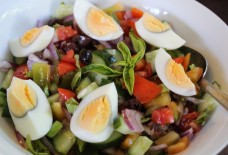Commentary: On being Muslim in Trump's America
By Loubna El Amine
Chicago Tribune
I’m a Muslim. I do not pray. I do not fast during Ramadan. I drink alcohol and eat pork. I do not believe in God. But I identify as a Muslim. Islam is a large part of the world I grew up in; it is inseparable from home.
The world in which I grew up in Lebanon included practicing and nonpracticing Muslims. It also included many Christians. But my family is Muslim; so is our culture. Extended family celebrations often revolved around the Eids, for which we would buy new clothes and meet for elaborate lunches, the children excitedly hoping for money, the Eidiyya, from the grown-ups. During Ramadan, we met our cousins, many of whom fasted the whole month, for iftar, breaking the fast with them as soon as the muezzin finished his prayer.
When I think back on my grandmothers, I often remember them praying in a calm, naturally lit room in the back of the house. I would catch a glimpse of them through an open door, white translucent veils running down their shoulders, kneeling down on the prayer mat, murmuring words that intrigued me and that I longed to learn.
I never learned the prayers, but I listened to many stories from Islamic history told by my father, often refracted through the great Muslim historian Ibn Khaldun, whom my father liked to read and quote: deeds of the prophet, his relationship to his companions, the passing of political authority to the caliphs, the struggles that ensued. But I also learned the stories of the caliphs, and especially of the Shiite Imams Hassan and Hussein, at funerals, in which professional readers would recount them in a tearful voice, slowly rising up in pitch, until it turned into cries, sending the mourners into uncontrollable sobs.
I also learned the Fatiha, the first sura of the Koran, from my mother, who encouraged me to recite it when I had trouble falling asleep as a child. I now recite it when we visit the tombs of my grandparents and uncles and aunts, kneeling by them, one hand on the marble. But I have found myself lately reciting the Fatiha when I am anxious, for example on airplanes, as I have become increasingly fearful of turbulence during flights. I do not recite it unconsciously, unaware of the meaning of the act, but as skeptical as I am, I still find it soothing. Perhaps what it ultimately conjures up is my mother’s protection, not God’s. But she expressed this protection through this religious gesture, which she probably learned from her own mother. To be a Muslim, to me, is precisely to have inherited these gestures, the rituals with which I grew up, and which have become a part of me.
Does this make me a Muslim according to President Trump’s definition? It sometimes seems as if his view of religion amounts to holding a certain set of beliefs (hence the proposed religious test) rather than a memory, a ritual or a culture. I did not choose to be a Muslim, but it was not imposed on me either. It is just part of who I am, just like being Lebanese, or a woman or a (former) resident of Beirut.
So far Trump’s ban has not included my country, Lebanon, though it does fall under the rubric of a “Muslim-majority” country. And because I do not wear any religious dress, I have been spared the harassment inflicted by some of his supporters on women who wear the veil. But I still very much feel included when he talks of “Muslims.” The problem, of course, cannot be with the different answers millions of us give to the question of being a Muslim; the problem is with the question. It is the wrong one to ask, and for all the wrong reasons.








